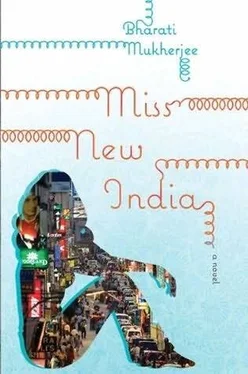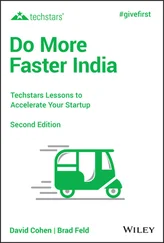At a crossroads village south of Nagpur in eastern Maharashtra, near the Andhra Pradesh border-really just a cluster of tea stalls and a petrol pump called Nizambagh-prostitutes and their children, and maybe just desperate women fleeing their villages for work in cities, swarmed the parked row of long-haul trucks. The women were lined up, holding their babies, and the drivers lifted their lungis and the women climbed onto the running boards and performed their services. It was not a view of India from behind a limousine window. Anjali walked like a ghost past the trucks; nothing shocked her, nothing disgusted her. She could see herself armed with a knife or a gun, walking down the row of trucks parked at night and executing every single driver and his helper. If hell and all the citizens of damnation had an Indian address, it was here. If she ever saw Rabi again, she'd have something to tell him. Had he been here? Had he caught this picture?
Somewhere down south in Bangalore, drawing closer every hour, a luxurious neighborhood called Kew Gardens and an old lady named Minnie Bagehot waited with a room for her, she prayed, and an Usha Desai to give her a job bigger than her father's.
On a hand-painted signboard, she saw the arrows: west for Mumbai and south for Hyderabad, which she knew to be in the direction of Bangalore. It was a crossroads for her as well, two possible fates, different buses. She went to the ladies' toilet, the very center of hell, the foulest few square inches in the universe, and changed into her last clean T-shirt, her favorite, Panzer Delight. She was nearer to Mumbai than Bangalore, just a day and a half away to the west, just the Ghats and a desert and a second range of mountains to cross, but no one could tell her when the Mumbai bus would arrive, and she couldn't bear the thought of another minute of the lingering stench. The Hyderabad bus was ready to leave. She couldn't wait; she couldn't stand to watch the women and children and the truck drivers with their insolent faces, and the knowledge that she was just a little luckier, but fundamentally no different.
The numb certitudes of her life: I have no family. The only money in my pocket comes from a man whose world is alien to mine and whom I'll never see again. I have no job, no skills. School teaches little.
IT WAS NOON in Hyderabad, a legendary city she never thought she'd visit. At least she had been dropped at its bus depot early in the morning and been able to sit on a bench for two hours and sip hot tea before heading to the line for the last bus, the final leg. "Bangaluru? Bangaluru?" she kept asking, having learned Bangalore's southern name, though she could not read the southern script. By following vague hand gestures and leaving her perch two hours before the scheduled departure, she'd managed to stand near the head of the line. At boarding time, however, passengers lugging heavy burlap sacks and taped-together cardboard boxes had rushed from behind and shoved her aside. But nonetheless she was now on the bus to Bangalore. Five hundred and sixty more kilometers to go. Two thousand kilometers behind her. Assuming no breakdowns, there'd be another hot day and a cold all-nighter on the bus. Bangalore by morning.
A dozen times in the night, the bus from Hyderabad passed through cities many times the size of Gauripur, and Angie thought, This must be Bangalore. Six million, seven million, Peter had said, sixty, seventy lakhs, how could she imagine such numbers? But the bus would merely stop under a streetlamp to let off or take on a passenger or two, then ease back into the black of the night. She couldn't read the strange scripts of southern languages, and they seemed impossible to speak, all thudding consonants linked with breathless spurts. She, so proud of her Hindi and English and even, if pushed, her Bangla, had been struck deaf and dumb.
Gradually the stops grew more frequent, the towns more closely connected, and the streets busier, even in the dark. Then, a few minutes after sunrise, they joined a long line of buses and pulled into Majestic, the open-air, bowl-shaped Bangalore bus depot.
She hadn't expected to start her new life half-frozen, exhausted, and starving. On the crowded intercity buses, she'd fought sleep all night, every night, guarding her precious cookie tin, which she held with both hands on her numbed lap. All she'd eaten during the week since leaving Patna were greasy samosas and scalding tea, which hawkers passed through the bus windows. Most passengers had either brought home-cooked food in tiffin carriers or gotten off the bus for hearty meals at roadside stalls. The spicy smells had tormented Angie, but she hadn't dared leave her suitcase unprotected in the luggage rack. The hard-sided Samsonite was too heavy to carry on and off the bus for food breaks. Now, as passengers elbowed her aside to lift their baggage out of overhead racks and stepped on her painted toes in their scramble to get off, the arrival in Bangalore seemed like the beginning of another ordeal.
Even from the side of the bus, at seven in the morning, she could see building cranes swivel, scoop up giant vats of concrete and tons of bricks, and reach into the dawn-bright heavens. Mechanical cranes controlled by a single man, not the long lines of women and children tipping their small bowls of concrete. The roads around the depot were already clogged with traffic. This was energy, something palpable that she'd never experienced, and it left her frightened and indecisive. She'd never witnessed "progress" or placed herself in its path.
Angie was finally standing and stretching but she felt unrefreshed; the dull ache of an early morning sun after a cold, wakeful night, the throbbing diesel clouds off a metallic ocean of dented bus roofs, the hundreds of vendors and laborers shouldering their bags and boxes, all with a purpose and a destination, drained her confidence. Unlike Gauripur, Bangalore had built its fancy bus depot far from the city center. This was the first morning of her new life, but it felt like death. Barely seven in the morning, and even villagers were loading their burlap sacks of fruits and vegetables and heading up the roads feeding into the city. All she had was an address on a torn piece of paper: Bagehot House, Kew Gardens.
She'd assumed South India (when she'd considered it at all) to be at least as backward as Gauripur. But Gauripur, and Bihar state in general, were exceptions to the industrious, prosperous north. South Indians were smart in math but too frail and pious to show much initiative. She remembered her Indian literature class, taught by a Keralan priest, in which she'd tried to read a novel by a southern writer named Narayan, set in a village-Malgudi, the writer called it-probably not too far from Bangalore. Father (Dr.) Thomas pronounced its characters the authentic voice of South India, as comforting to him (not even a Hindu) as sweetened rice, as healthy as fruit and yogurt, and as stimulating as thick, rich, steaming traditional coffee. The book offered nothing to her except the revelation that traditional Hinduism, one of the pillars of her parents' lives, was totally irrelevant to the life she wanted to live.
So, who was responsible for something as roaringly capitalistic as Bangalore? Certainly not diminutive vegetarians reciting the Vedas under a banyan tree. While still on the intercity bus, glancing out the window, she'd seen more crosses than she'd ever imagined in India. Christians, then? Certainly not South Indian Christians like Father "Elephant Fart" Thomas. Who supplied the energy, the go-for-broke, rule-bending, forget-about-yesterday, and let's-blow-it-all confidence for this transformation? Foreigners like Peter Champion? Internal migrants, displaced northerners like her? Peter had once talked of accident and propinquity in the rise of capital; if Bombay is oversubscribed, overpriced, where can new capital go? It went farther south. If she ever ran into Rabi Chatterjee again, she'd ask him to take a picture of the Bangalore bus depot and send it back to Father (Dr.) Thomas. Where's your tiny, tranquil Malgudi now? He'd die!
Читать дальше












